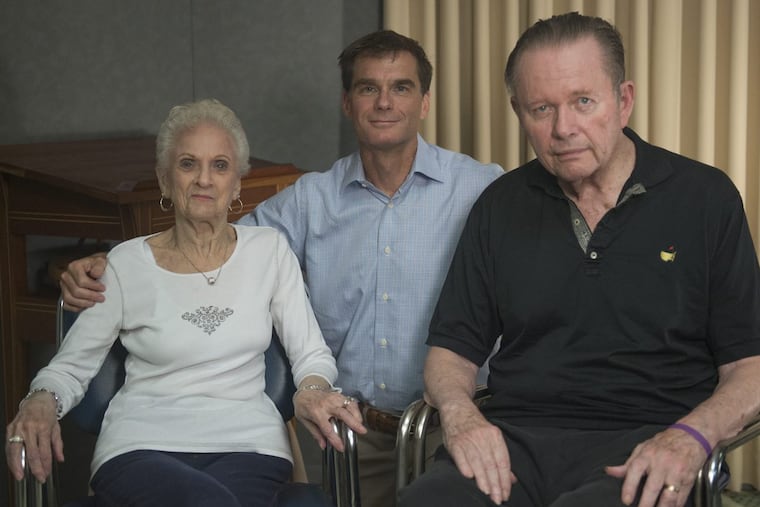The wisdom of my patient, Bill Lyon | Perspective
Bill's essays aren't just about living with Alzheimer's. They're about living with life's burdens. "Why not try to do something? Try and create something good out of something bad."

The moment the woman spoke out, I wished we had the cameras running.
We were in the lobby of Wesley Enhanced Living, a continuing-care retirement community, with retired Inquirer sports columnist Bill Lyon and Ethel, his wife. After the couple's 42 years of living in a four-bedroom, three-story house in Broomall, Bill's Alzheimer's had made life in that house too difficult. First he lost the car, then he got a cane, now "enhanced" living.
We were meeting Bill in his new home to interview him about how he became an Alzheimer's writer. Some visitors were preparing to depart when one of them called out from the other side of the lobby.
"You're the columnist? The Alzheimer's columns, right?"
Bill smiled, nodded, and introduced himself. She was on her feet and making for him like a winning teammate at the final buzzer.
"I love your columns," she announced. "My husband had it, had Alzheimer's. He's gone now. … Everything you said, it's so true." They embraced like champions.
Just over one year ago, I first wrote about my patient, Bill Lyon. I explained his diagnosis ("posterior cortical atrophy," an uncommon form of the disease whose initial symptoms are problems with depth perception and attention) and the steps he, his family, and I — "the guy in the white coat" — had taken to diagnose and then treat his disease.
Today, I'm explaining what I've learned about being a patient by listening to my patient. Researchers are hard at work trying to discover better treatments. Bill, though neither scientist nor physician, has been hard at work on a treatment as well. He's discovered a powerful medicine. Just ask the woman who embraced him.
In the weeks and months after I diagnosed him, he hid his diagnosis. "I didn't want to be around crowds anymore. I would be off by myself. I was like a loner." His feelings of isolation were changing him. He worried people would treat him differently, would think less of him. He worried they would go out of their way to avoid him. "It was almost like you're a leper," he reflected.
The stigmata of Alzheimer's is a cruel mark upon a person. Bill observed how, unlike a disease that physically marks you, such as measles or mumps, Alzheimer's is hidden until you choose to engage with people. That's when the problems come out. The troubles finding words, the tremor. And that's why he hid in plain sight.
But then he started to change. Slowly and then all at once, he came to see Alzheimer's as not just a personal disease, but a family one, because whether as patient, caregiver, or family member, we all have Alzheimer's. If we shun the person with the disease, if the person hides, then we're hiding from one another. We're shaming ourselves.
He decided to change the culture, to challenge the norm that we avoid people with Alzheimer's, a norm that makes the person with the disease feel ashamed and so hide from others, and so feel more shame. And so on into an abyss.
This six-time Pulitzer finalist who'd made his reputation with hundreds of essays about athletes, people pushing the limits of their physical and mental powers, decided to use his talent to tell the story of losing his powers. Giving up driving, turning finances over to trusted others, taking up a cane, wearing diapers, enduring tremors. A sense of hopelessness.
"It became a crusade on my part," Bill tells me. "I wanted to explain to people, just because you have Alzheimer's disease, it doesn't mean you're an outcast."
Bill's essays aren't just about living with Alzheimer's. They're about living with life's burdens. "We all have a load to bear," he explains. "The load takes many different forms, but there's something that's on your shoulders, and it's up to you to do something about it." One of those choices is to start talking about our fears. "Why not try to do something? Try and create something good out of something bad."
It has been bad, and it's getting worse. Bill observed to me how to write is to bleed. He was talking about the struggle of practicing the craft, of getting the right word and keeping subject and action as close as possible. As his disease carries on, the craft is harder to practice.
He's bleeding in other ways, too. Writing about his and Ethel's life with Al has shed their privacy. He has offered up himself and his world to us, giving up himself so that others may learn more about themselves.
Bill took a big and uncommon risk, and his sacrifice is our reward. We feel not only our sufferings, but also the sufferings of others. We are Bill. And Ethel. We are the woman in the lobby moved to embrace him.
Jason Karlawish is a professor at the Perelman School of Medicine and codirector of the Penn Memory Center. Jason.Karlawish@uphs.upenn.edu